
AI's Impact on Marketing in 2023 & Future Trends
In this article, we delve into the exciting world of artificial intelligence (AI) and its profound impact on the marketing industry. As we stand at the threshold of 2023 and beyond, the marketing landscape is undergoing a remarkable transformation, driven by the relentless advancement of AI technologies. From automating routine tasks to uncovering invaluable insights, AI has become an indispensable tool for marketers seeking to stay competitive in the digital age.
In this blog:
- The Power of AI in Personalization
- Predictive Analytics for Hyper Targeting
- Chatbots for Enhanced Consumer Engagement
- Intelligent Content Creation & Optimization
- Data-Driven Marketing Strategies
- Ethical Considerations and Challenges Ahead
- Embracing the AI Revolution in Marketing
AI’s Transformative Role in Marketing
In this comprehensive exploration, we’ll embark on a journey through the current state of AI in marketing, offering a glimpse into the myriad ways it is reshaping the field. We’ll navigate the evolving trends, innovations, and strategies that are setting the course for marketing success in the years to come. So, fasten your seatbelts as we embark on a fascinating odyssey through the AI-driven revolution that is defining the future of marketing.
The Power of AI in Personalization
In today’s marketing landscape, personalization has become the cornerstone of successful customer engagement. Consumers expect more than generic messages; they want tailored experiences that resonate with their unique preferences and needs. Fortunately, artificial intelligence (AI) is revolutionizing the way marketers approach personalization, offering the capability to deliver highly targeted content across various channels by analyzing vast amounts of consumer data.
Analyzing Vast Amounts of Consumer Data
AI’s prowess lies in its ability to process enormous datasets rapidly and efficiently. This means that your marketing team can tap into insights hidden within the vast expanse of consumer data. Whether it’s understanding shopping habits, content consumption patterns, or social media interactions, AI can process this information on a scale and at a speed that human efforts simply can’t match.
Deeper Understanding, Highly Targeted Content
Modern machine learning algorithms have elevated personalization to unprecedented levels. No longer limited to using a customer’s first name in emails, AI empowers marketers to delve deep into the intricacies of consumer behavior and preferences. For instance, AI can analyze past purchase history, website interactions, and even sentiment analysis of social media posts to construct a 360-degree view of each customer.
Delivering Across Multiple Channels
AI doesn’t stop at understanding consumer preferences; it excels in delivering highly targeted content across a spectrum of channels. Whether it’s email marketing, social media advertising, website recommendations, or even chatbots, AI-driven personalization ensures that the right message reaches the right person at the right time.
The outcome? Marketers can craft hyper-personalized campaigns that boost engagement, increase conversion rates, and nurture customer loyalty. It’s a win-win scenario where customers receive content that genuinely matters to them, and marketers enjoy improved ROI on their marketing investments.
Predictive Analytics for Hyper-Targeting
In this section, we will explore the power of predictive analytics powered by AI. Predictive analytics empowers marketers to anticipate customer behavior with uncanny accuracy. By leveraging historical data, machine learning algorithms can identify patterns and trends, allowing marketers to optimize their targeting strategies.
Google Analytics Predictive Metrics
This is a powerful tool within Google Cloud or Google Analytics that provides predictive insights, such as potential revenue from a customer segment. It’s ideal for understanding and anticipating customer behaviors. If you’re using Google Analytics you can access these predictive metrics from Explorations, click Explore in the left navigation.

Cost: New customers get $300 in free credits to run, test, and deploy workloads. All customers can use 20+ products for free, up to monthly usage limits.
HubSpot’s Predictive Lead Scoring
A feature of HubSpot CRM, it uses machine learning to score leads based on their likelihood to convert, helping marketers target the most promising prospects.
Cost: Predictive Lead Scoring is only available in the Enterprise plan for Hubspot Marketing Hub ($3,600/month) or Sales Hub ($1,200/month).
Salesforce Einstein Analytics
This AI-powered analytics tool from Salesforce offers advanced predictive analytics capabilities, enabling marketers to make data-driven decisions and personalize customer interactions.
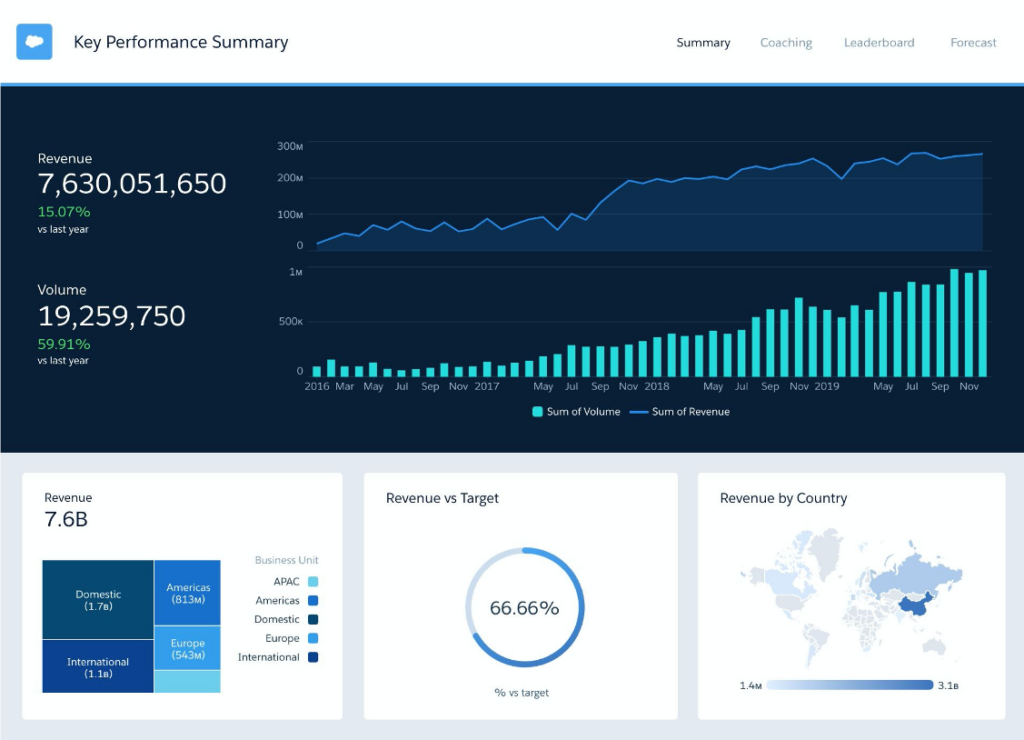
Cost: The pricing for Salesforce Einstein Analytics starts at $75/month and can go as high as $165/month for the CRM Analytics Plus package.
Adobe Analytics
Offers predictive analytics features that help marketers understand customer paths and predict future behaviors, allowing for more targeted marketing campaigns.
Cost: Adobe Analytics pricing is based on how much traffic your site receives, ranging from $2,000/month all the way to $100,000/year for huge companies.
Marketo
Known for its engagement platform, Marketo also offers tools for predictive content and analytics, helping marketers to tailor their messaging based on predicted customer preferences.
Cost: The Marketo pricing is now based on how much you use the product and what your specific company needs are since the platform is not owned by Adobe.
Pardot by Salesforce
Provides AI-powered predictive analytics for B2B marketing, helping in identifying the best leads and optimizing marketing strategies.
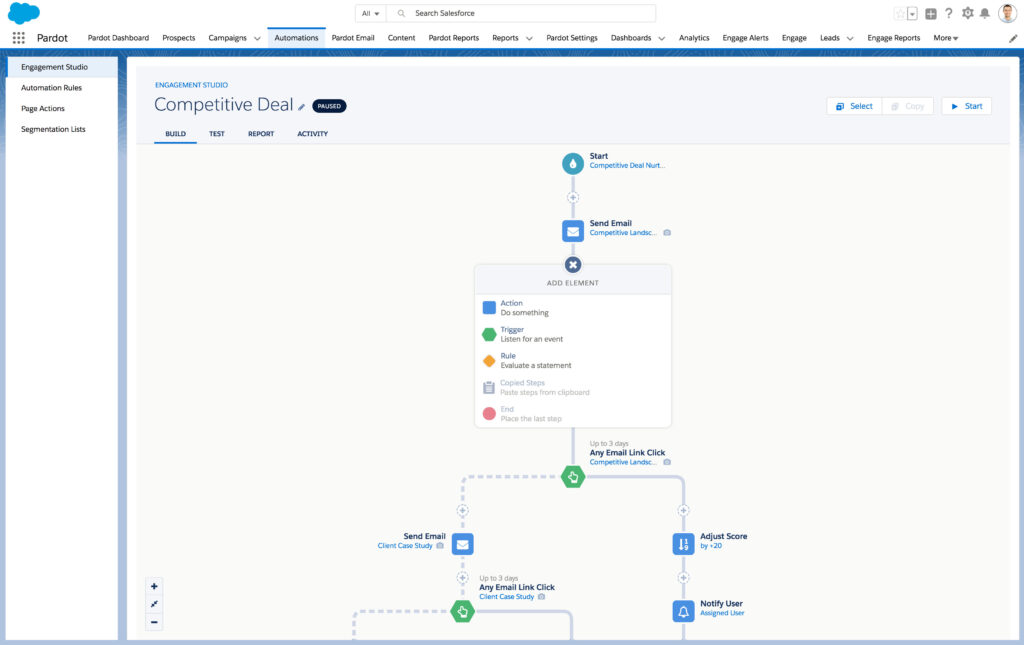
Cost: Pardot starts at $1,250/month for the Growth plan and can go as high as $4,000+/month for the Advanced plan.
Optimizely
Great for A/B testing and data-driven decision making. It offers predictive analytics to understand customer preferences and improve the user experience.
Cost: Optimizely pricing depends on your use case and size of company, but most companies can expect to spend $36,000/year for the smallest plan.
Kissmetrics
A behavioral analytics and engagement platform that uses predictive analytics to understand customer behavior and improve targeting strategies.
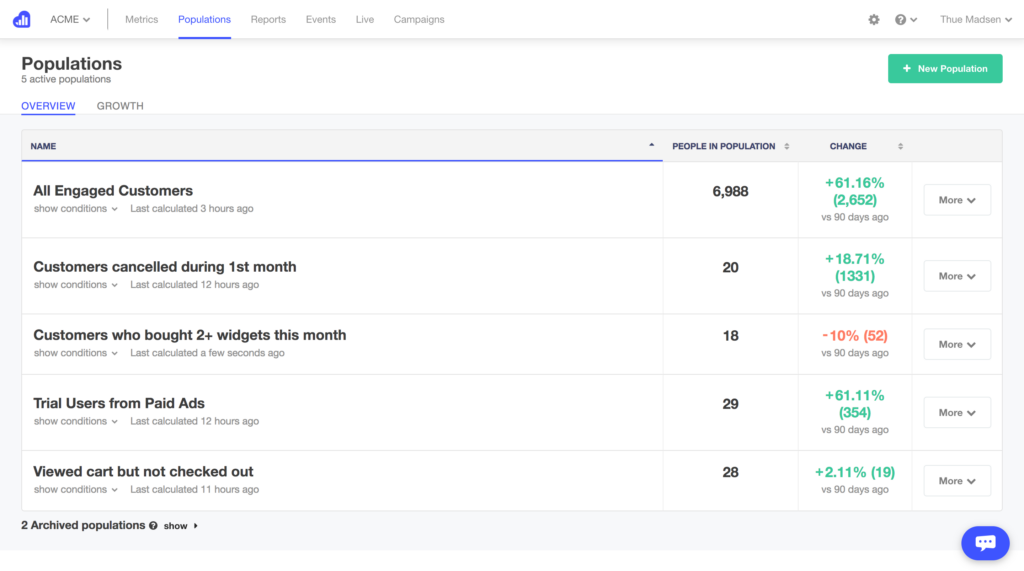
Cost: Kissmetrics has a wide variety of pricing options ranging from $26/month to $5,000/month. They also have a pay-as-you-go method which is priced around $0.0025/event.
Zoho Analytics
A self-service BI and analytics platform that offers predictive analytics to gain insights into business trends and customer preferences.
Cost: Zoho Analytics is priced between $24/month and $455/month for Enterprise users of the tracking platform.
Leadfeeder
Tracks website visitors and uses predictive analytics to score them based on their likelihood of buying, helping in targeting the most promising leads.
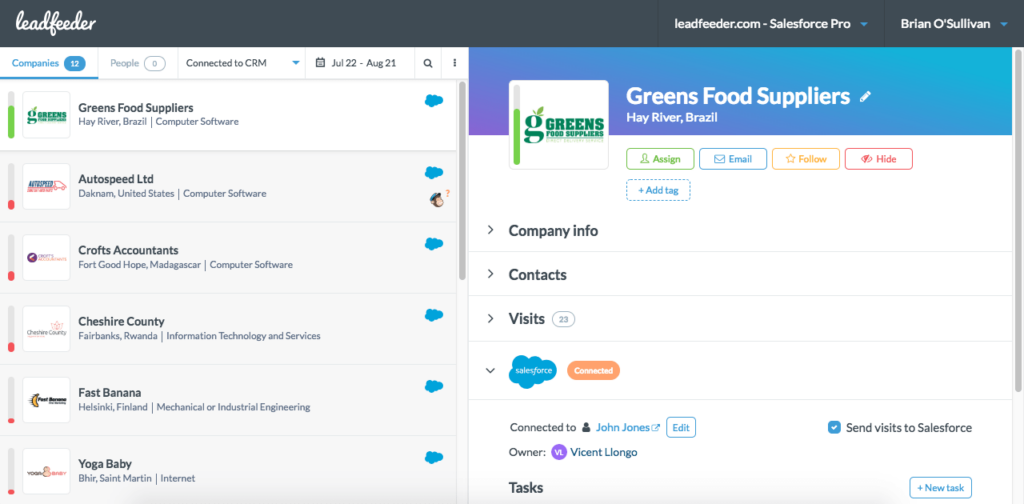
Cost: Leadfeeder provides a free plan that you can use to track data from the last 7 days, but for expanded use they have a $139/month plan as well.
ChatGPT4 Plus Users
ChatGPT plugins are one such suite of tools that can integrate seamlessly with analytics platforms, providing a user-friendly experience while delivering powerful insights. Let’s explore some of the standout plugins that are redefining the way we interact with data.
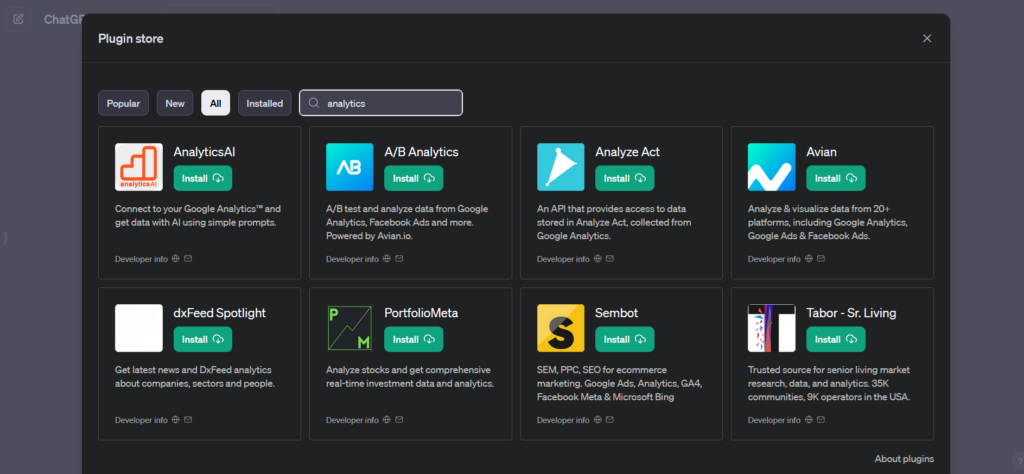
AnalyticsAI Plugin: AnalyticsAI is a nifty tool that connects directly to your Google Analytics™ account, using AI to interpret complex data. It’s designed for those who need quick insights without sifting through charts and tables. By using simple prompts, you can ask questions and receive answers in a format that’s easy to understand, making data-driven decisions faster and more accessible.
A/B Analytics: With the A/B Analytics plugin, you can conduct A/B tests effortlessly across different marketing platforms like Google Analytics and Facebook Ads. This tool, powered by Avian.io, takes the guesswork out of which campaign performs better by providing clear, analytical evidence. It’s perfect for marketers who want to optimize their ads without getting bogged down by the intricacies of data analysis.
Analyze Act: The Analyze Act plugin offers a unique API that unlocks the data within its ecosystem, collected from Google Analytics. This means you can have a more comprehensive view of your website’s performance and user behavior, enabling you to act on concrete insights to improve your online presence.
Avian: Avian stands out by offering analytical prowess over data from more than 20 platforms, including heavyweights like Google Analytics, Google Ads, and Facebook Ads. Its visualization capabilities allow you to see the big picture of your marketing efforts and tweak them for optimal performance.
dxFeed Spotlight: For those who need the latest news and analytics on companies, sectors, and key figures, dxFeed Spotlight is the go-to plugin. It’s a wealth of information for staying updated and making informed decisions based on the latest market trends.
PortfolioMeta: Investors, rejoice! PortfolioMeta is here to revolutionize the way you analyze stocks. With comprehensive real-time investment data and analytics, this plugin gives you the insights you need to make timely and informed investment decisions.
Sembot: Sembot is the virtual assistant every e-commerce marketer needs, specializing in SEM, PPC, and SEO for platforms like Google Ads, Analytics, GA4, Facebook Meta, and Microsoft Bing. It streamlines your marketing efforts by providing actionable insights and automating routine tasks.
Tabor – Sr. Living: Tabor is an indispensable resource for those in the senior living industry, offering trusted market research, data, and analytics. With information on over 35K communities and 9K operators in the USA, it’s the definitive guide for understanding and succeeding in the senior living market.
These ChatGPT plugins offer a fresh perspective on analytics, allowing you to distill complex data into actionable insights. Whether you’re a small business owner, a digital marketer, or an investor, integrating these tools into your strategy can lead to smarter, data-backed decisions. Analytics no longer has to be daunting; with these plugins, it can be your stepping stone to success.
Chatbots for Enhanced Customer Engagement
The role of chatbots in customer engagement has evolved significantly with AI. Chatbots are now revolutionizing customer service interactions by providing instant responses, personalized product recommendations, and even facilitating purchases on behalf of customers. AI-driven chatbots are becoming increasingly sophisticated in understanding and responding to natural language processing.

The Rise of Voice Assistants in Marketing
Within the realm of chatbots, we dive deeper into the emerging role of voice assistants such as Amazon’s Alexa or Apple’s Siri. These voice assistants have opened up new channels for marketing products or services through conversational interactions with consumers. We explore how voice-based marketing is shaping the future of customer engagement.
Intelligent Content Creation & Optimization
In the ever-evolving world of digital marketing, content remains king. However, keeping up with the insatiable demand for high-quality content can be a daunting task. This is where AI steps in, transforming the way marketers create and optimize content. In this section, we’ll explore the powerful impact of AI in content creation and its role in supercharging SEO strategies.
AI-Generated Content
AI-driven content generation is revolutionizing the way marketers produce materials for their campaigns. Whether it’s articles, blog posts, social media updates, or product descriptions, AI-powered tools can generate compelling and relevant content with remarkable speed and accuracy.
Marketers are finding that AI augments human creativity rather than replacing it. By automating repetitive content generation tasks, AI frees up time for marketers to focus on strategic planning, creativity, and other high-value activities.
Imagine a tool that can generate product descriptions for hundreds of products in minutes, adapt the tone and style of writing to suit different audiences, and even optimize content for SEO. That’s the power of AI in content creation, and it’s reshaping the marketing landscape.
AI-generated content goes beyond just filling in the gaps. These systems can create entire articles or reports from scratch based on a brief or a set of keywords. The content they produce is often indistinguishable from what a human writer might create.
However, it’s important to note that AI-generated content is most effective when it’s used as a tool to assist human writers rather than replace them entirely. Human oversight ensures that the content aligns with the brand’s voice and messaging and adheres to ethical and legal standards.
SEO Optimization with AI
Search engine optimization (SEO) is the cornerstone of online visibility, and AI is becoming an invaluable ally in this endeavor. Marketers are increasingly turning to AI algorithms to enhance their SEO strategies, from the initial stages of keyword research to the fine-tuning of on-page optimization.
One of the most significant advantages of using AI in SEO is the ability to process vast amounts of data and derive actionable insights. AI algorithms can analyze keyword trends, competitive landscapes, and user behavior patterns to inform SEO strategies.
For example, AI can identify long-tail keywords that are highly relevant to a business but might have been overlooked in traditional keyword research. It can also help in optimizing website content by suggesting improvements in structure, readability, and keyword usage, all of which contribute to improved organic search rankings.
In essence, AI is streamlining SEO processes, making them more efficient and data-driven. By harnessing the power of machine learning, marketers can stay ahead in the race for search engine visibility and ensure that their content reaches the right audience at the right time.
The marriage of AI-driven content creation and SEO optimization is reshaping the digital marketing landscape, offering new avenues for marketers to engage with their target audiences effectively.
Adding AI Tools to Your SEO Arsenal
To fully leverage AI in your SEO efforts, consider integrating these tools into your strategy:
- AI-Powered Keyword Research Tools:
- These tools go beyond simple keyword suggestions, using semantic analysis to understand the context and user intent behind search queries, offering a richer set of keywords to target. Tools to consider:
- Ahrefs: Known for its Keywords Explorer, Ahrefs provides thousands of keyword suggestions with detailed information on keyword difficulty and search volume.
- SEMRush: This tool’s Keyword Magic feature uses AI to generate and sort keyword suggestions by various metrics like volume, keyword difficulty, and competitive density.
- Pricing: From $129 per month

- Content Optimization Software:
- Leveraging natural language processing, these platforms can evaluate your content for SEO friendliness and suggest optimizations for readability, keyword density, and meta tags. Tools to consider:
- Surfer SEO: Utilizes AI to analyze your content against the top-performing pages in your niche and provides recommendations to improve on-page elements.
- MarketMuse: This platform applies AI to assess your content and gives suggestions for topics, keywords, and questions to better meet user search intent.
- Pricing: From $0 to $399/month
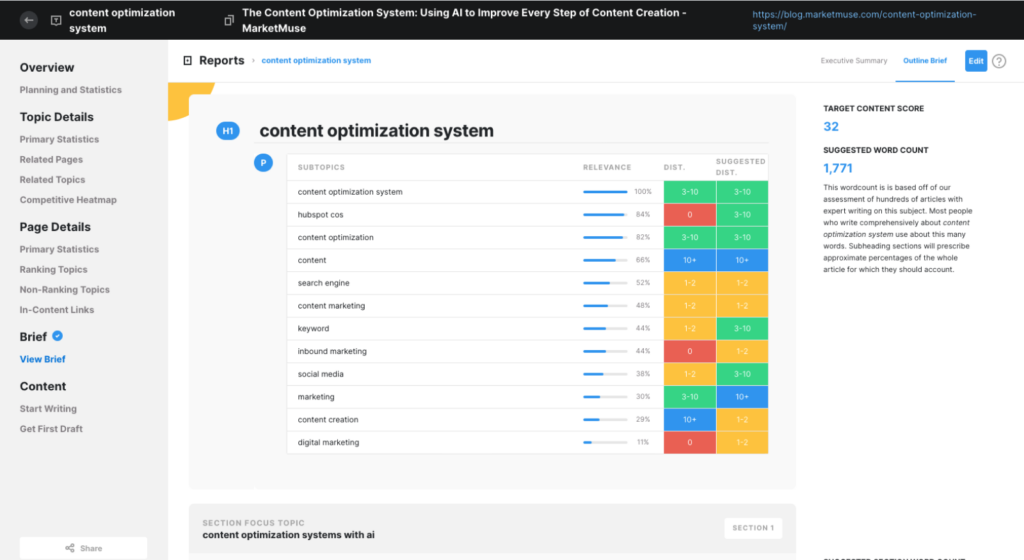
- Automated SEO Auditors:
- AI algorithms can crawl your website similar to how search engines do, providing insights on SEO health, backlinks, and technical issues that could impact your rankings. Tools to consider:
- Screaming Frog SEO Spider: Employs AI to crawl websites and provide critical insights for SEO, including broken links, redirects, and page titles.
- Moz Pro: Features an in-depth Site Crawl tool that uses machine learning to identify SEO issues and provide actionable recommendations.
- Pricing: From $99/month to $599/month
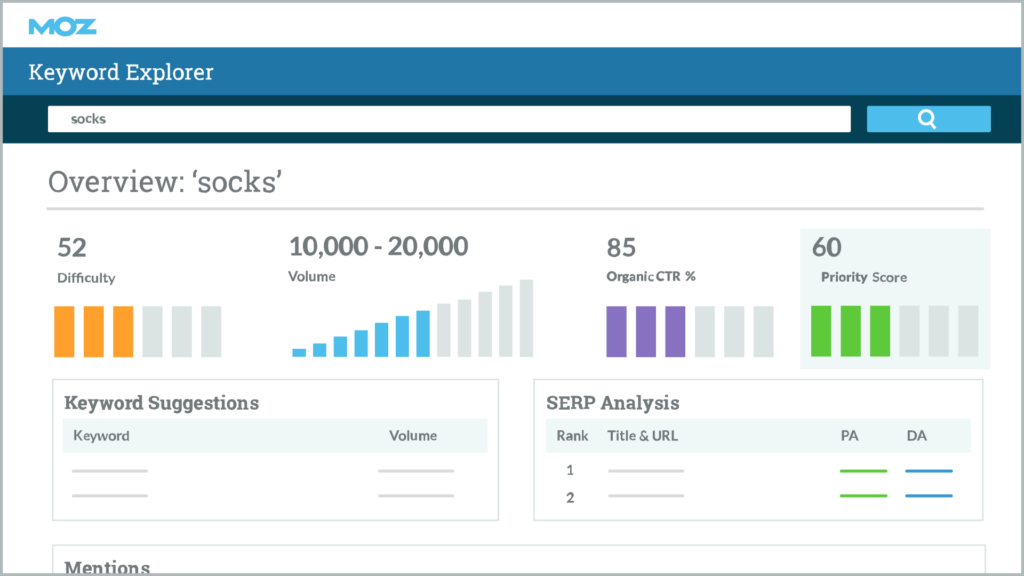
- Predictive Analytics for Trend Spotting:
- By analyzing search trends and patterns, AI can predict upcoming opportunities, enabling you to create content that aligns with future searches. Tools to consider:
- Google Trends: Coupled with AI analysis tools, it can predict shifts in search behaviors, allowing you to anticipate upcoming trends in your content strategy.
- SpyFu: Offers AI-driven insights into competitors’ historical data and keyword strategies, which can help predict future trends.
- Pricing: From $39/month to $79/month
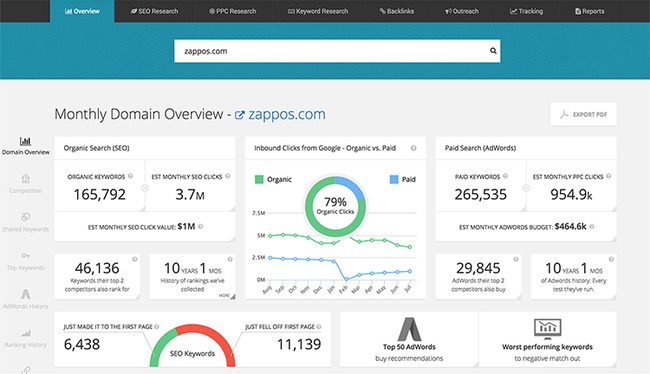
- Voice Search Optimization Tools:
- With voice search becoming more prevalent, these tools help optimize your content for conversational keywords and phrases that are more likely to be used in spoken queries. Tools to consider:
- PAA Box by SEMRush: Helps optimize for voice search by finding questions and queries related to your keyword likely to appear in Google’s “People Also Ask” boxes.
- Moz Local: Ensures your local listing information is optimized for voice search across all platforms, which is crucial for local SEO.
- Pricing: From $14/month to $33/month
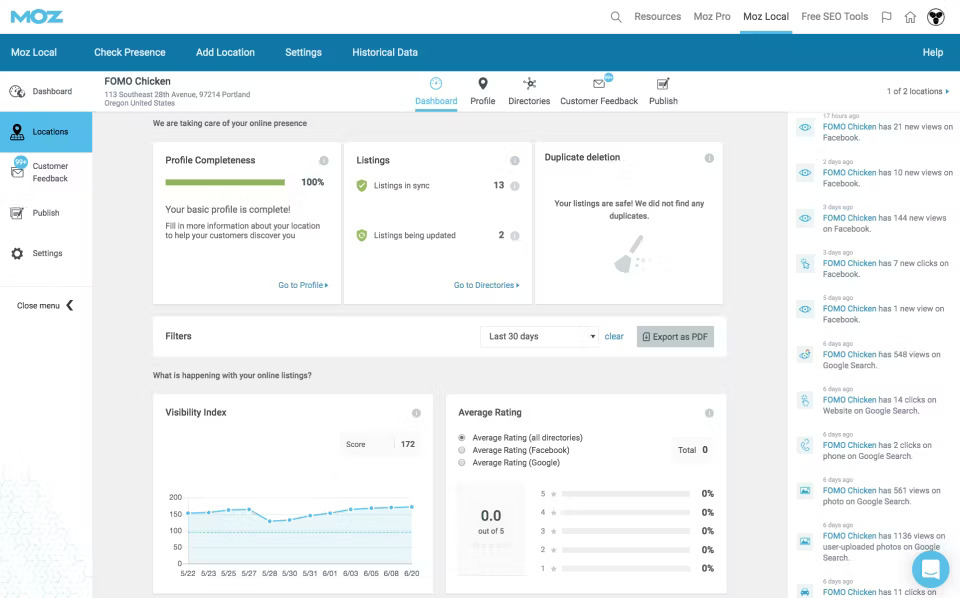
- AI-Driven Link Building Assistants:
- These tools can identify potential link-building opportunities by analyzing link profiles of similar content and suggesting authoritative sites for backlinks. Tools to consider:
- BuzzStream: Combines AI with outreach tools to help identify and engage with potential link-building prospects in an efficient manner.
- Linkody: Uses machine learning to monitor backlinks, analyze link-building campaigns of competitors, and identify quality link opportunities.
- Pricing: From $14.90/month to $153.90/month
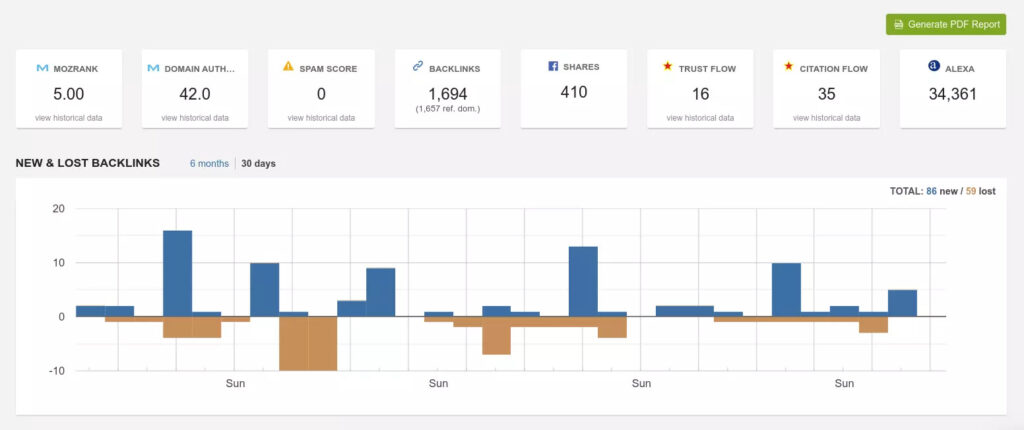
By incorporating these AI tools into your SEO toolkit, you can enhance your approach to digital marketing, making sure you’re not just keeping pace but setting the pace in a highly competitive online world.
SEO Optimization for ChatGPT 4 Plus Users
Navigating the SEO landscape can be complex, but with the right set of tools, it becomes a journey of strategic victories. The following collection of ChatGPT plugins, enhanced with AI capabilities, are designed to streamline your SEO process. From on-page analysis and technical audits to content creation and backlink strategy, these plugins offer a comprehensive suite of tools that cater to various aspects of SEO. Whether you’re a seasoned marketer or a small business owner, these plugins can help elevate your website’s ranking and improve your overall online visibility.
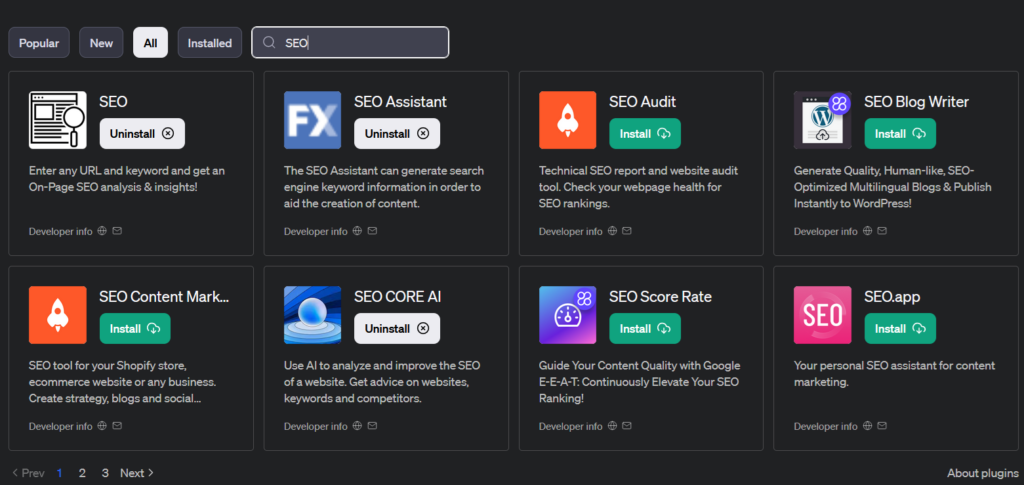
SEO Plugin This plugin provides a straightforward on-page SEO analysis for any given URL and keyword combination, delivering insights that can help you refine your content to rank better in search engine results.
SEO Assistant SEO Assistant utilizes search engine data to assist content creation, providing keyword suggestions and topical insights to help you craft content that’s both relevant and competitive.
SEO Audit SEO Audit is a technical SEO tool that offers comprehensive website audits, helping you identify and fix issues that could be hindering your website’s SEO performance.
SEO Blog Writer Generate SEO-optimized, human-like blog posts and directly publish them to WordPress with SEO Blog Writer, an AI-driven content creation tool that caters to multilingual audiences.
SEO Content Marketing A specialized tool for Shopify stores and ecommerce sites, SEO Content Marketing assists in developing content strategies, creating blogs, and managing social media to boost SEO.
SEO CORE AI SEO CORE AI is an analytics tool that uses AI to provide recommendations for website improvements, keyword strategies, and competitive analysis.
SEO Score Rate Guides your content strategy by applying Google’s E-A-T principles, helping you elevate your SEO ranking through continuous quality enhancements.
SEO.app Your personal assistant for SEO content marketing, SEO.app helps optimize your content strategy for better search engine rankings.
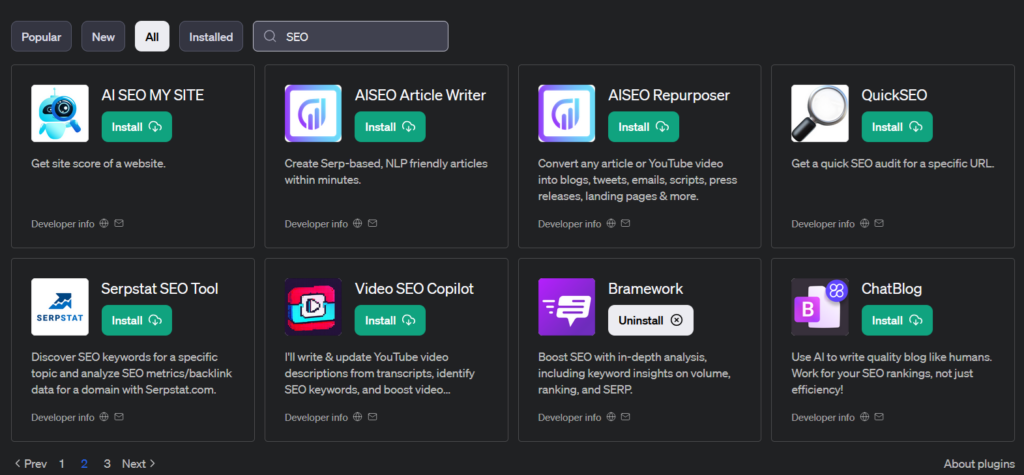
AI SEO MY SITE AI SEO MY SITE offers a simple site score, giving you an at-a-glance understanding of your website’s overall SEO performance.
AISEO Article Writer Craft NLP-friendly, SERP-based articles in minutes with AISEO Article Writer, designed to streamline content creation and enhance your SEO efforts.
AISEO Repurposer This tool allows you to repurpose content from articles or YouTube videos into multiple formats like blogs, tweets, and emails, maximizing your content’s reach and SEO potential.
QuickSEO Get a fast, targeted SEO audit for any specific URL to quickly identify areas of improvement with the QuickSEO tool.
Serpsat SEO Tool With Serpstat SEO Tool, discover and analyze SEO keywords for a specific topic and delve into SEO metrics and backlink data with Serpstat.com integration.
Video SEO Copilot Optimize your YouTube content with Video SEO Copilot, which writes and updates video descriptions from transcripts, identifies SEO keywords, and boosts video SEO.
Bramework Bramework boosts your SEO with in-depth analysis, providing keyword insights, volume, ranking, and SERP data to enhance your content’s visibility.
ChatBlog ChatBlog uses AI to create quality, human-like blog posts designed to improve your SEO rankings efficiently and effectively.
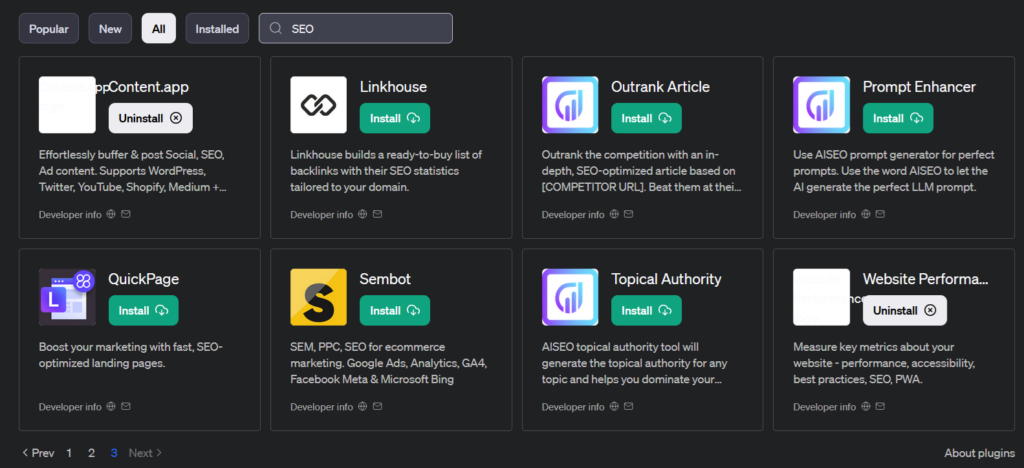
Content.app Buffer and post SEO and social media content effortlessly with Content.app, supporting a wide range of platforms from WordPress to Shopify and beyond.
Linkhouse Linkhouse builds a tailored list of backlink opportunities complete with SEO statistics, helping you secure valuable connections to enhance your site’s authority.
Outrank Article Outrank Article helps you craft in-depth, SEO-optimized articles that directly compete with a specified competitor’s URL, aiming to outrank them in search results.
Prompt Enhancer Perfect your content prompts with AISEO Prompt Enhancer, designed to generate the ideal LLM prompt for any content creation need.
QuickPage Boost your marketing efforts with QuickPage, which provides fast, SEO-optimized landing pages to attract and engage visitors.
Sembot Sembot is a comprehensive tool for e-commerce marketing, covering SEM, PPC, SEO, and integrating with platforms like Google Ads, Analytics, Facebook Meta, and Microsoft Bing.
Topical Authority Establish yourself as a leader in your niche with the AISEO Topical Authority tool, which generates the topical authority for any subject to dominate your market segment.
Website Performance Assess key metrics about your website with Website Performance, focusing on performance, accessibility, SEO, and best practices to ensure a top-notch online presence.
In summary, the ChatGPT SEO plugins present a robust arsenal for tackling the diverse challenges of search engine optimization. By employing these AI-enhanced tools, you can gain a competitive edge in keyword research, content optimization, and performance analysis. They are a testament to how AI is revolutionizing SEO, making sophisticated strategies accessible to all levels of expertise. Incorporate these into your SEO toolkit to not just aim for better search engine rankings, but to achieve them with precision and ease.
Data-Driven Marketing Strategies
In today’s rapidly evolving digital landscape, data has emerged as the cornerstone of effective marketing strategies. The fusion of data and artificial intelligence (AI) technology has given rise to data-driven marketing, a paradigm shift that empowers marketers with the tools to make informed decisions, predict consumer trends, and provide highly personalized experiences. In this section, we will delve into the transformative power of AI-driven data in marketing.
Personalized Recommendations through Machine Learning
Imagine visiting an online retail platform, and instead of being inundated with an overwhelming array of products, you are greeted with a carefully curated selection of items that align perfectly with your tastes and preferences. This level of personalization is the result of AI-driven machine learning algorithms working tirelessly behind the scenes.
At its core, personalized recommendations are a testament to the prowess of machine learning. These algorithms analyze an extensive trove of customer data, encompassing past purchases, browsing history, demographic information, and even real-time behavior. Through this analysis, machine learning models construct a comprehensive understanding of individual consumer behavior, enabling them to make highly accurate and relevant product recommendations.
The beauty of these algorithms lies in their ability to continuously adapt and refine their recommendations as more data is gathered. This means that the longer a user engages with a platform, the more tailored and precise their product suggestions become.
The advantages of personalized recommendations are manifold. On one hand, they significantly enhance the customer experience by simplifying decision-making and ensuring that customers are presented with products or services that resonate with them. On the other hand, they drive business outcomes by increasing the likelihood of conversions and, consequently, revenue.
Dynamic Pricing with Predictive Analytics
Pricing has always been a pivotal aspect of marketing strategy, and AI-powered predictive analytics are fundamentally transforming how businesses approach this critical area. Dynamic pricing, a concept often associated with e-commerce and the airline industry, involves the real-time adjustment of prices based on a variety of dynamic factors.
Predictive analytics, underpinned by AI, play a central role in devising optimal dynamic pricing strategies. These algorithms consider an array of variables, including demand forecasts, competitor pricing, historical sales data, and patterns in consumer behavior. By synthesizing and analyzing this data, AI algorithms can suggest pricing adjustments that maximize revenue and profit.

For instance, in the realm of e-commerce, dynamic pricing may entail raising the price of a product during periods of high demand or lowering it during slower periods. This agile pricing strategy ensures that prices remain competitive and responsive to market dynamics.
The application of dynamic pricing extends beyond e-commerce and is gaining traction in various sectors, including hospitality, ride-sharing, and even live events. AI-driven pricing models are agile and adaptable, enabling businesses to stay competitive and optimize their revenue streams.
By incorporating data-driven marketing strategies such as personalized recommendations and dynamic pricing into their operations, businesses can not only enhance their bottom line but also provide customers with more relevant and customized experiences. In doing so, they solidify their position in an increasingly competitive market landscape.
Ethical Considerations & Challenges Ahead
As artificial intelligence (AI) continues to reshape the marketing landscape, it brings with it a set of ethical considerations that marketers and businesses must navigate. In this section, we explore these ethical concerns and the challenges that lie ahead for AI-driven marketing.
Ethical Concerns in AI Marketing
- Privacy Protection: AI-driven marketing often relies on extensive data collection, which can raise concerns about user privacy. Marketers must ensure that data is collected and used transparently and ethically. The mishandling of personal information can result in a loss of consumer trust and legal repercussions. In an era of data breaches and growing concerns about privacy, marketers must prioritize the security and responsible use of consumer data. Transparency in data collection and the ability for users to opt in or out of data sharing are critical components of maintaining ethical practices in AI marketing.
- Data Bias: AI algorithms are trained on data, and if that data contains biases, the AI can perpetuate those biases in marketing decisions. Marketers must be vigilant in identifying and mitigating biases to ensure fair and equitable marketing practices. Addressing bias in AI algorithms requires ongoing monitoring and adjustments. Marketers should collaborate with data scientists and AI developers to ensure that algorithms are trained on diverse and representative datasets.
- Transparency: The opacity of AI algorithms can be a cause for concern. Consumers may be uncomfortable with decisions made by algorithms they do not understand. It’s crucial for marketers to provide transparency in how AI is used and decisions are made. To build trust, marketers should communicate openly about the role of AI in marketing processes. Providing explanations for AI-driven decisions, when possible, can help consumers feel more at ease with AI technologies.

Challenges in AI-Driven Marketing
- Integration Complexity: Integrating AI into existing marketing strategies can be complex. Marketers may face challenges in training their teams to use AI tools effectively and integrating AI seamlessly into their workflows. Successful integration requires a clear strategy and a commitment to ongoing education and training. Marketers should work closely with AI vendors or experts to ensure a smooth transition.
- Data Quality: AI relies heavily on data quality. Marketers must ensure that the data used to train AI models is accurate and up-to-date. Poor data quality can lead to inaccurate predictions and decisions. Data governance practices, including data cleaning and validation, are essential. Marketers should invest in data quality initiatives to ensure the reliability of AI-driven insights.
- Regulatory Compliance: As AI marketing evolves, regulations surrounding data privacy and AI usage are also evolving. Marketers must stay updated with these regulations and ensure compliance to avoid legal issues. A dedicated legal and compliance team should be in place to monitor and adapt to changing regulations. Transparency with consumers about data usage and compliance efforts is key.
- Consumer Trust: Building and maintaining consumer trust is paramount. Marketers must strike a balance between personalization and privacy, ensuring that consumers feel their data is used responsibly and with their consent. Marketers should implement robust consent mechanisms and actively seek feedback from consumers about their data privacy concerns. Being proactive in addressing these concerns can help strengthen trust.
- AI Reliability: AI is not infallible, and it can make mistakes. Marketers need to have contingency plans in place for instances when AI-driven decisions or campaigns do not produce the desired results. Creating a fail-safe plan, along with human oversight of AI systems, can help identify and rectify issues quickly. Marketers should be prepared to adapt their strategies based on real-time feedback.
- Costs and ROI: Implementing AI technologies can be costly, and measuring the return on investment (ROI) can be challenging. Marketers must carefully evaluate the cost-effectiveness of AI solutions and track their impact on revenue. A comprehensive cost-benefit analysis is essential before adopting AI solutions. Marketers should establish clear KPIs and metrics for tracking ROI and continuously assess the value AI brings to their marketing efforts.
In navigating these ethical considerations and challenges, marketers can harness the power of AI while maintaining the trust and confidence of their audience. Ethical AI practices and a commitment to transparency will be essential in shaping the future of AI-driven marketing.
Embracing the AI Revolution in Marketing
In this comprehensive exploration of the role of artificial intelligence (AI) in marketing, we have witnessed how AI has already begun to transform the landscape and set the stage for a future of unprecedented possibilities. Let’s recap the key takeaways:
- 1. Personalization Redefined: AI is revolutionizing personalization by enabling marketers to connect with individual consumers on a deeper level. Predictive analytics and AI-driven content recommendations are ushering in a new era of tailored marketing experiences.
- 2. Enhanced Customer Journey: AI is not only improving personalization but also helping marketers map and optimize the customer journey. Real-time insights into consumer behavior are reshaping marketing strategies and driving more meaningful interactions.
- 3. AI-Generated Content: The era of AI-generated content is upon us. Marketers are leveraging AI to create blog posts, product descriptions, and social media updates, streamlining content creation processes and enhancing efficiency.
- 4. Predictive Marketing: AI-driven predictive marketing is empowering businesses to anticipate customer needs and market trends, allowing for more proactive and effective campaigns.
- 5. Hyper-Personalized Advertising: AI is driving hyper-personalization in advertising, ensuring that each ad speaks directly to the individual viewer. This leads to higher ad relevance and engagement.
- 6. Ethical Considerations: As AI’s role in marketing grows, so does the need for ethical considerations. Transparency, fairness, and responsible AI practices are becoming paramount in maintaining consumer trust.
- 7. AI as a Creative Partner: AI is becoming an invaluable creative partner for marketers, aiding in idea generation, design, and optimization, ultimately leading to more innovative and effective campaigns.
The marketing landscape is evolving at an unprecedented pace, and AI is at the forefront of this transformation. It has become clear that embracing AI-powered technologies is no longer an option but a necessity for marketers who wish to remain competitive and relevant in the digital world.
As we look ahead to 2023 and beyond, the opportunities for AI-driven marketing are boundless. With the power to analyze data at scale, personalize experiences, and drive more effective strategies, AI is poised to reshape the industry continually.
The future of marketing belongs to those who leverage AI as a powerful ally. It’s a future where creativity meets data-driven insights, where personalization becomes the standard, and where ethical practices guide innovation. The journey is ongoing, and marketers must stay curious, adaptive, and forward-thinking to navigate the exciting road ahead in the AI revolution of marketing.